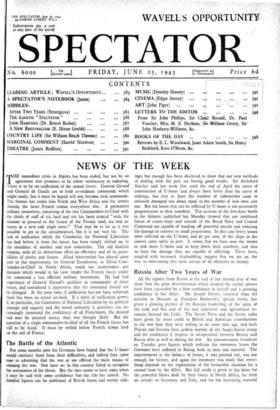The Battle of the Atlantic
For some months-past the Germans have hoped that the U-boats would extricate them from their difficulties, and indeed they came near to admitting that the war at sea offered the main means of winning the war. Nor have we in this country failed to recognise the seriousness of the threat. But the time seems to have come when it may be said with some confidence that the tide has turned. No detailed figures can be published of British losses and enemy sink- ings, but enough has been disclosed to show that our new methods of dealing with the pest are having good' results. Sir Archibald Sinclair said last week that until the end of April the curve of construction of U-boats had always been faster than the curve of sinkings, but that in June the number of submarines sunk or seriously damaged was about equal to the number of new ones sent out. But the losses' that can be inflicted by U-boats is not necessarily proportionate to their numbers. The account of the five-days battle in the Atlantic published last Monday showed that our combined forces of escort-ships and aircraft of the Royal Navy and Coastal Command are capable of warding off powerful attacks and reducing the damage to convoys to small proportions. In this case heavy losses were inflicted on the U-boats, and 97 per cent. of the ships in the convoy came safely to port. It seems that we have now the means to- sink more U-boats and so keep down their numbers, and also to limit the damage they are capable of inflicting. These facts, coupled with increased shipbuilding, suggest that we arc on the way to overcoming this most serious of all obstacles to victory.






























